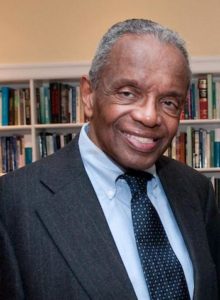
Derrick Bell
*Derrick Bell was born on this date in 1930. He was a Black lawyer, professor, writer, and activist.
Derrick Albert Bell Jr. was born in the Hill District of Pittsburgh and received a B.A. from Duquesne University in 1952. He was a Duquesne Reserve Officers' Training Corps member and later served as an Air Force officer for two years (stationed in Korea). 1957, he received an LL.B. from the University of Pittsburgh School of Law.
After graduation, Bell took a position with the civil rights division of the U.S. Justice Department. In 1959, the government asked him to resign his membership in the National Association for the Advancement of Colored People (NAACP) because it was thought that his objectivity and department might be compromised or called into question. Bell left the Justice Department rather than giving up his NAACP membership. Soon afterward, Bell was an assistant counsel for the NAACP Legal Defense and Educational Fund (LDF), crafting legal strategies at the forefront of the battle to undo racist laws and segregation.
At the LDF, he worked alongside prominent attorneys such as Thurgood Marshall, Robert L. Carter, and Constance Baker Motley. Bell was assigned to Mississippi. While working at the LDF, Bell supervised more than 300 school desegregation cases and spearheaded James Meredith's fight to secure admission to the University of Mississippi.
He said: "I learned a lot about evasiveness and how racists could use a system to forestall equality; I also learned a lot riding those dusty roads and walking into those sullen hostile courts in Jackson, Mississippi. It just seems that unless something's pushed, unless you litigate, nothing happens." 1967 Bell was appointed to the University of Southern California law faculty as executive director of the Western Center on Law and Poverty.
Following the Brown v. Board of Education decision and its apparent lack of progress for Black students, Bell grew interested in studying racial struggles within the education system. During the 70s, he studied and wrote about the effects of desegregation. He noted that desegregation did not undo the injustices set by segregation in the first place but created a whole new set of problems for black students attending predominantly white schools. The aftermath of Brown was a great disappointment as it produced detrimental repercussions for black students who remained to be seen as inferior to white students.
Bell concluded, therefore, that the focus of American educational systems should not be on national integration but, rather, should be on improving the quality of education provided for black students. His early work on education contributed to his position on Critical Race Theory. Bell's critique challenged the dominant liberal and conservative position on American Civil Rights, race, and the law. He employed three major arguments in his analyses of racial patterns in American law: constitutional contradiction, the interest convergence principle, and the price of racial remedies.
His book Race, Racism and American Law, now in its sixth edition, has been continually in print since 1973 and is considered foundational in Critical Race Theory. Bell also wrote science fiction short stories, including "The Space Traders," in which white Americans trade black Americans to space aliens to pay off the national debt and receive advanced technology such as environmental decontaminants and alternatives to fossil fuels. His story maintained that whites act to protect their white self-interest.
Bell explained, "[It's] better [to] risk the unknown in space than face the certainty of racial discrimination here at home." The story was adapted for television in 1994 as the leading segment of a three-part anthology, Cosmic Slop, which focused on Black science fiction and was produced by George Clinton. In addition to his writings, Bell was also a revered and accomplished teacher. His constitutional law courses took a critical but comprehensive student-centered approach, and he was well known for his kindness toward students.
On October 5, 2011, Derrick Bell died from carcinoid cancer at St. Luke's-Roosevelt Hospital in New York City at 80. “At the time, the dean at NYU, Richard Revesz, said, “For more than 20 years, the law school community has been profoundly shaped by Derrick's unwavering passion for civil rights and community justice, and his leadership as a scholar, teacher, and activist." He loved his students compassionately and encouragingly- he even taught the week before his death. He has been memorialized at the University of Pittsburgh School of Law with Derrick A.
The Barco Law Library opened Bell Constitutional Law Commons on March 20, 2013. Bell was also honored with renaming the school's community law clinic that provides legal assistance to local low-income residents, the Derrick Bell Community Legal Clinic. Two fellowship positions within the school are also named for Bell.